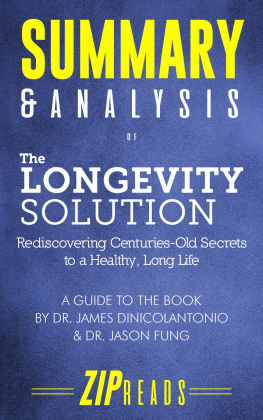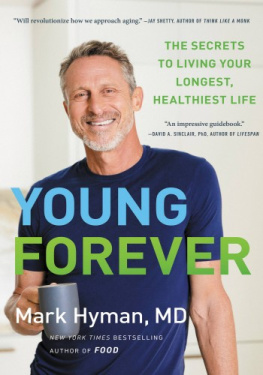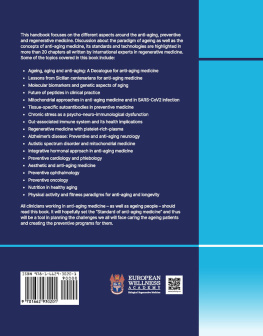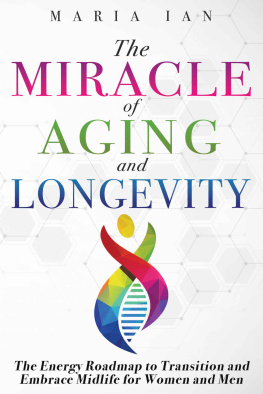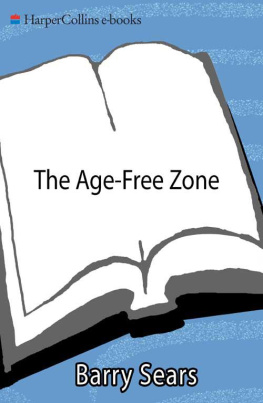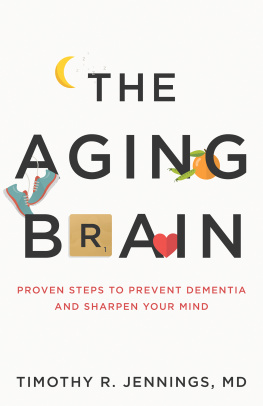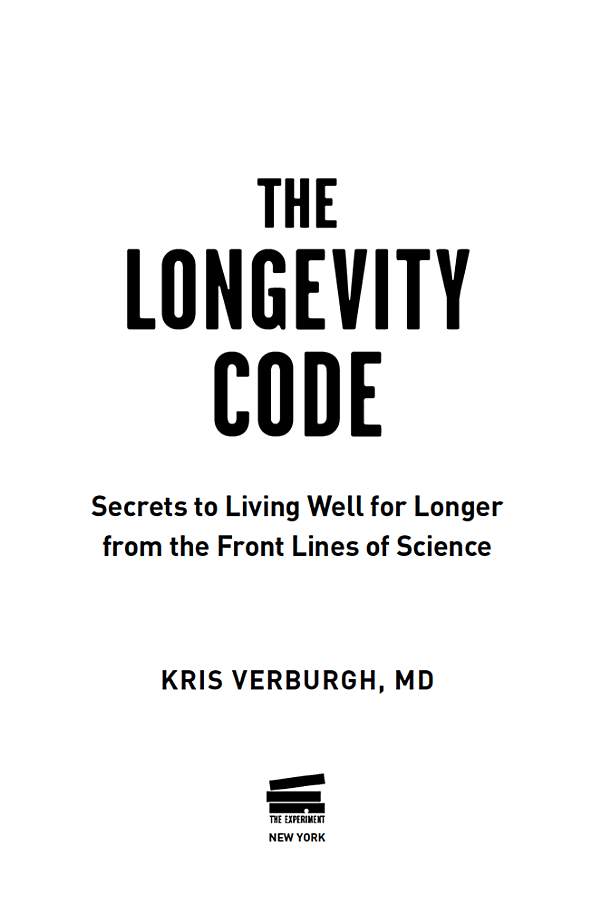
The Longevity Code: Secrets to Living Well for Longer from the Front Lines of Science
Copyright 2015, 2018 by Kris Verburgh
Illustrations copyright 2015 by CMRB, unless otherwise indicated
Translation copyright 2018 by The Experiment, LLC
Originally published in the Netherlands as Veroudering Vertragen by Prometheus/Bert Bakker in 2015. First published in English in North America by The Experiment, LLC, in 2018.
All rights reserved. Except for brief passages quoted in newspaper, magazine, radio, television, or online reviews, no portion of this book may be reproduced, distributed, or transmitted in any form or by any means, electronic or mechanical, including photocopying, recording, or information storage or retrieval system, without the prior written permission of the publisher.
The Experiment, LLC
220 East 23rd Street, Suite 600
New York, NY 10010-4658
theexperimentpublishing.com
This book contains the opinions and ideas of its author. It is intended to provide helpful and informative material on the subjects addressed in the book. It is sold with the understanding that the author and publisher are not engaged in rendering medical, health, or any other kind of personal professional services in the book. The author and publisher specifically disclaim all responsibility for any liability, loss, or riskpersonal or otherwisethat is incurred as a consequence, directly or indirectly, of the use and application of any of the contents of this book.
Many of the designations used by manufacturers and sellers to distinguish their products are claimed as trademarks. Where those designations appear in this book and The Experiment was aware of a trademark claim, the designations have been capitalized.
The Experiments books are available at special discounts when purchased in bulk for premiums and sales promotions as well as for fund-raising or educational use. For details, contact us at info@theexperimentpublishing.com.
Library of Congress Cataloging-in-Publication Data
Names: Verburgh, Kris, 1986
Title: The longevity code : secrets to living well for longer from the front lines of science
/ Kris Verburgh.
Other titles: Veroudering Vertragen. English
Description: New York : The Experiment, [2018] | Originally published in
Dutch as: Veroudering Vertragen (Amsterdam : Prometheus/Bert Bakker,
2015). | Includes bibliographical references and index.
Identifiers: LCCN 2017025679 (print) | LCCN 2017029381 (ebook) | ISBN
9781615194254 (ebook) | ISBN 9781615194131 (cloth)
Subjects: LCSH: Longevity. | Aging--Prevention. | Life spans (Biology)
Classification: LCC RA776.75 .V4613 2018 (ebook) | LCC RA776.75 (print) | DDC
613.2--dc23
LC record available at https://lccn.loc.gov/2017025679
ISBN 978-1-61519-413-1
Ebook ISBN 978-1-61519-425-4
Translation by Tina Vonhof
Cover and text design by Sarah Smith
Author photograph by Michel Porro/Contour/Getty Images
Manufactured in the United States of America
Distributed by Workman Publishing Company, Inc.
Distributed simultaneously in Canada by the University of Toronto Press
First printing January 2018
10 9 8 7 6 5 4 3 2 1
PREFACE
We live in a strange world . A world in which people are mortal. A world in which most life-forms age and die. There are a few exceptions: organisms that do not age, that are immortal, or that can even become younger. But for the large majority of everything that walks, crawls, swims, or flies on this earth, mortality is an integral part of existence. That is strange, because from a biological viewpoint there is no reason why aging and mortality should exist. For centuries biologists have addressed the question of why something as strange as aging exists. As we shall see, aging is not simply the result of what is generally thought to be inevitable wear and tear, nor is aging meant to combat overpopulation, whereby older animals must make room for younger animals.
In this book we will discuss why some organisms age very rapidly and other organisms can grow hundreds or thousands of years old or not age at all. In the second part of the book we will talk about what happens in our body that makes us age. Once we have a better understanding of why we age, we will also be better able to figure out how we can slow down the aging process. That is what the third part of this book is about. We will see that certain foods, interventions, and substances can slow down the rate at which we age. The problem in the West is that we are consuming too many foods that accelerate aging and cause obesity as well. It is not a coincidence that overweight people are at risk of all kinds of aging-related diseases, such as heart attack, dementia, and diabetes. We will also see that the epidemic of obesity is not simply a matter of too many calories and too little exercise, as is often claimed.
Then we will focus on therapies that are currently being developed to slow down aging or that are already in use to treat certain rare diseases that bear similarities with aging. Not only can these therapies drastically slow down the aging process but they could even reverse it. Reversing aging means making people younger, such as by erasing wrinkles, making blood vessels elastic again, and curing aging-related diseases, such as heart failure and Alzheimers disease. We will see that this is not impossible. To the contrary, many scientists are amazed by how easy it is to reprogram a body into a more youthful state. In the final part of this book we will discuss the great social revolutions that are rapidly approaching due to the fact that we will be living longer and longer. Current life expectancy increases by six hours every day, and in a relatively near future, when technologies become available to drastically slow down the aging process and even reverse it, we must consider a scenario in which people can stay healthy and young for a very long time. Even without these new technologies we know that the first person who will reach the age of 135 has already been born. Some scientists even suggest that the first person to reach the age of 1,000 has also already been born.
Regardless of whether the latter will turn out to be true, one thing is certain: Our increasing knowledge will enable us to transform disease, life, and death. This future is closer than we think, and therefore we need a plana plan that will enable us to benefit from this future revolution as much as possible, so that we have a greater chance of enjoying the fruits of these new developments. This book is intended to serve as a guideline for that plan. First, however, we need to understand why something as strange as aging exists to begin with.
A brief note: This book contains references to scientific studies. The references are added to serve as an introduction for those readers who want to delve deeper into the matter. Every claim I make in this book is based not only on the references mentioned in this book but on my training as a medical doctor, my research, thousands of other scientific studies, books, articles, lectures, and conversations with experts in their fields.
INTRODUCTION
Why do we have to die? This is one of the most important questions one can ask. It is, after all, the question why our existence is finite. Although the answer is very interesting, misunderstandings surrounding it abound. One reason for this is because the question can be answered in two ways: why we age, and what causes aging. The why examines why aging exists in the first place; why does it occur in nature? The what looks at exactly what takes place in the body that causes it to age.
Next page

